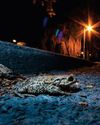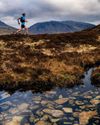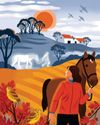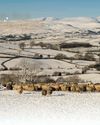Recording neighbourhood nature helps us protect wildlife - and ourselves
BBC Countryfile Magazine
|History Special 2025
Recently, two otters appeared separately in our village. At the same time, three great white egrets - large, still-rare white herons - turned up, too.

We hadn't been flooded, but the spotting of these wetlandloving species and, crucially, the recording of their presence, helped us see our familiar landscape in a different way - and to become newly excited about it.
There are two small chalk streams in our village, as well as ditches, garden ponds and lakes at the big houses. But I never dreamt either of these species would be here, even when researching and writing a book on otters for the RSPBa few years ago. It tooka friend messaging me late one night to say, sadly, she'd found a dead otter by the side of the road.
Standing with my daughter at the spot, just after midnight, we were aware of the trickle of the stream quietly running under the road, ina way we hadn't been before. A narrow winterbourne, that dries up in summer and wends quite secretly through gardens, fields and woods, felt full of fresh possibility.
Esta historia es de la edición History Special 2025 de BBC Countryfile Magazine.
Suscríbete a Magzter GOLD para acceder a miles de historias premium seleccionadas y a más de 9000 revistas y periódicos.
¿Ya eres suscriptor? Iniciar sesión
MÁS HISTORIAS DE BBC Countryfile Magazine

BBC Countryfile Magazine
Manors and meadows
This December marks 250 years since Jane Austen's birth. To celebrate, Jack Watkins ambles around Chawton, where the writer penned novels that changed fiction forever
7 mins
December 2025

BBC Countryfile Magazine
TOP 10 ROYAL RESIDENCES
Castles, palaces and stately homes open a window into the history and private lives of the British monarchy
9 mins
December 2025

BBC Countryfile Magazine
Your countryside
HAVE YOUR SAY ON RURAL ISSUES
1 mins
December 2025

BBC Countryfile Magazine
Community spirit
Rural pubs across Britain are closing at an alarming rate - but local people are fighting back to save inns that have been at the hearts of their villages for centuries. Vivienne Crow orders a pint
4 mins
December 2025

BBC Countryfile Magazine
Gift ideas for nature lovers
Find inspirational and thoughtful presents for all the family in our pick of top outdoor gear and a round-up of this year's best nature and wildlife books
2 mins
December 2025

BBC Countryfile Magazine
Toad numbers are in freefall.It's in our power to save them
After becoming engaged at Christmas in 1998, my new fiancé and I were confronted by an enormous toad on the way to meet the vicar.
2 mins
December 2025

BBC Countryfile Magazine
Conquer fell running
Infamously tough yet famously friendly, the sport of fell running will take your fitness to new heights amid the wildest landscapes. Here's our beginners' guide
3 mins
December 2025

BBC Countryfile Magazine
A glorious haunting
They lived in the same village and shared the same dreams – just 60 years apart.
6 mins
December 2025

BBC Countryfile Magazine
The big questions answered
Across the UK, but particularly in the southeast of England, giant and featureless buildings are springing up.
13 mins
December 2025

BBC Countryfile Magazine
Away in a manger
While most of us down tools and pick up the mince pies, a farmer's work doesn't stop for the festive break.
5 mins
December 2025
Listen
Translate
Change font size

